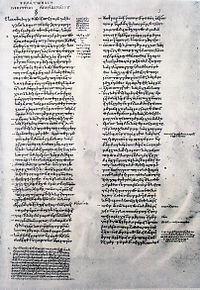
Back የፕላቶ ሪፐብሊክ Amharic गणराज्य (प्लाटो) ANP الجمهورية (أفلاطون) Arabic La República AST गणराज्य (प्लेटो) AWA Dövlət (Platon) Azerbaijani Дәүләт (Платон) Bashkir Държавата (Платон) Bulgarian রিপাবলিক (প্লেটো) Bengali/Bangla Ar Republik Breton
This article possibly contains original research. (April 2022) |
 Title page of the oldest complete manuscript: Paris, Bibliothèque Nationale, Gr. 1807 (late 9th century) | |
| Author | Plato |
|---|---|
| Original title | Πολιτεία |
| Language | Greek |
| Subject | |
| Published | c. 375 BC |
| Publication place | Ancient Greece |
| Text | Republic at Wikisource |
| Part of the Politics series |
| Republicanism |
|---|
|
|
| Part of a series on |
| Governance |
|---|
| Part of the Politics series |
| Basic forms of government |
|---|
| List of forms · List of countries |
|
|
The Republic (Ancient Greek: Πολιτεία, romanized: Politeia; Latin: De Republica)[1] is a Socratic dialogue authored by Plato around 375 BC, concerning justice (dikaiosúnē), the order and character of the just city-state, and the just man.[2] It is Plato's best-known work, and one of the world's most influential works of philosophy and political theory, both intellectually and historically.[3][4]
In the dialogue, Socrates discusses with various Athenians and foreigners the meaning of justice and whether the just man is happier than the unjust man.[5] He considers the natures of existing regimes and then proposes a series of hypothetical cities in comparison, culminating in Kallipolis (Καλλίπολις), a utopian city-state ruled by a class of philosopher-kings. They also discuss ageing, love, theory of forms, the immortality of the soul, and the role of the philosopher and of poetry in society.[6] The dialogue's setting seems to be the time of the Peloponnesian War.[7]
- ^ Henri Estienne (ed.), Platonis opera quae extant omnia, Vol. 2, 1578, p. 327.
- ^ Brickhouse, Thomas and Smith, Nicholas D. Plato (c. 427–347 BC), The Internet Encyclopedia of Philosophy, University of Tennessee, cf. Dating Plato's Dialogues.
- ^ National Public Radio (8 August 2007). Plato's 'Republic' Still Influential, Author Says Archived 20 September 2018 at the Wayback Machine. Talk of the Nation.
- ^ Plato: The Republic Archived 20 September 2018 at the Wayback Machine. Plato: His Philosophy and his life, allphilosophers.com
- ^ In ancient times, the book was alternately titled On Justice (not to be confused with the spurious dialogue of the same name). Lorenz, Hendrik (22 April 2009). "Ancient Theories of Soul". Stanford Encyclopedia of Philosophy. Retrieved 10 December 2013.
- ^ Baird, Forrest E.; Walter Kaufmann (2008). From Plato to Derrida. Upper Saddle River, New Jersey: Pearson Prentice Hall. ISBN 978-0-13-158591-1.
- ^ Although "there would be jarring anachronisms if any of the candidate specific dates between 432 and 404 were assigned". Nails, Debra (2002), The People of Plato: A Prosopography of Plato and Other Socratics. Hackett Publishing. ISBN 0-87220-564-9, p. 324
